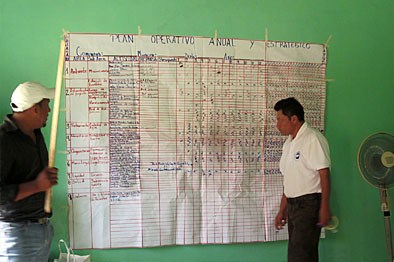Southern Honduras is part of the “dry belt” of the region, where 1 million homes depend on subsistence agriculture and are less prepared to cope with periods of extreme drought. The water is of low quality and there is a presence of chemicals, heavy metals, salinity, and sulfates.
More than 80 people from the municipality of Nacaome attended the workshop and learned about the protection of water sources, how to improve water services, sanitation, and proper disposal of solid waste. The training also included a discussion of the legal framework of the country which includes the Water Law, the Water and Sanitation Law, and the Regulation of Local Water Committees.
Annual Plan created
An annual plan was created which the participants agreed to disseminate in their own community assemblies. At the end of the workshop, the participants committed to creating a local fund for payments for environmental services that will be collected through a monthly water tariff. They also proposed having a waste collection and disposal campaign and talked about the need to identify solutions for the gray water generated in each household.
The activity was carried out by the Honduran Association of Local Water Committees (AHJASA), with the collaboration of the Ministry of Natural Resources through the National Watershed Network, both members of GWP Honduras.

